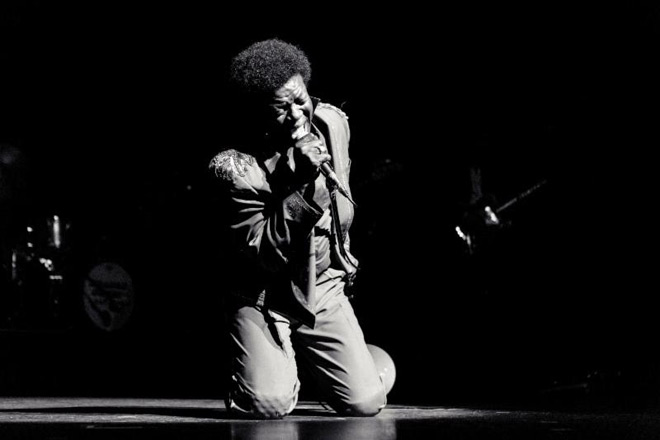
Tommy Brenneck, longtime musical partner of Bradley, is again the architect behind the scenes, and his Menahan Street Band appears on the majority of the tracks. Taking its title from the stage name the late Bradley used during his time impersonating James Brown, and hitting the streets just four days after the performer’s would-be 70th birthday, Black Velvet is a never before released tight collection of ten tracks recorded by Bradley during his three prior solo efforts: No Time for Dreaming (2011), Victim of Love (2013), and the most recent, Changes (2016), all of which saw release through Daptone.
Now, for those not too polished on this important musician’s background, let’s reflect back briefly. Bradley was born in Gainsville, Florida, and lived there with his grandmother until eight, when his mother collected him to live with her in Brooklyn, New York. At fourteen, he joined his sister at a James Brown concert, and Bradley was hooked, spending his free time privately perfecting the sound and look of Brown. Soon after, Bradley ran away from home, splitting time between the streets and subway cars in the city, before finding himself working as a chef in Bar Harbor, Maine, through a government jobs program. It was here that a co-worker urged the shy and stage fraught Bradley to perform in a small nearby club, and he was hooked.
His bandmates in Maine were soon drafted into service in the Vietnam War, and Bradley spent the next year hitchhiking to Alaska, before settling in California for close to twenty years, performing the odd concert in between odder jobs. Eventually, Bradley found his way back to Brooklyn to spend lost time with family, his ailing mother in particular. Soon after returning, his brother was murdered down the street from the apartment he shared with his mother, and it was her eventual death that led to Bradley taking the advice of Brenneck and famously covering “Changes” by Black Sabbath.
All this in mind, Black Velvet is a fitting celebration of Bradley and his legacy. In fact, it begins with a literal high note, as Bradley yawps a distinct “Oh!” to start the proceedings of “Can’t Fight the Feeling,” before taking his place in front of a bubbly horn section. Recorded back in 2007, this may be the oldest track on the album. Released as a single, “I Feel a Change” was recorded during the sessions for Victim of Love, his sophomore album, and the haunting vocals stand in contrast to the ebullient horns, guitar, and bass surrounding the singer. Then “(I Hope You Find) The Good Life” is a dusky psychedelic number supported chiefly by a drum machine laid beneath sparse instrumentation, meandering bass, and a joyful chorus. This is while “Luv Jones” is a funky duet with LaRose Jackson that saw earlier release as a single and inclusion on various compilations.
Additionally, three covers dot this album – Neil Young’s “Heart of Gold” (1972) and “Slip Away” (1967), the breakthrough recording from Rodriguez, pay due respect while maintaining Bradley’s unique touch, but the most impressive of the tributes has to be the third, “Stay Away.” Originally recorded by Nirvana for their breakthrough 1991 album Nevermind, the version put to tape by Bradley and his backing band would have easily fit onto a Motown single in the 1960s and is almost unrecognizable when stood next to its source material.
In a welcome juxtaposition, an alternate take of “Victim of Love” closes the album with full electric complement, whereas the original, boosted by inclusion on the soundtrack to the HBO series Big Little Lies a few years ago, was focused on Bradley and a smattering of acoustic backing. The penultimate track, “Fly Little Girl,” features Bradley also working on organ, including an interesting solo movement near the close, but overall the track is perhaps the weakest of the album. The haunting title-track serves as a break within the three covers—Bradley died before being able to put words to the song, so the Menahan Street Band simply leaves the space for his vocals empty and barren, serving as an eerie reminder about what could have been, on this track, this album, and many others in the future.
While the musical career of Charles Bradley can be traced back to the sixties, his recorded output, unfairly, begins barely a decade ago, for which the world can feel robbed. Rather than offer obscure songs scraped together from discarded tape, or worse, flimsy alternate takes of established material, Black Velvet instead stands as testament to the endless love and energy bottled within Charles Bradley, and how his material will change the mind and heart of anyone lucky enough to hear even a few choices. This is why CrypticRock give this final record 4.5 out of 5 stars.




No comment